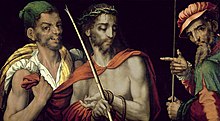This article relies largely or entirely on a single source. (October 2015) |


Luis de Morales (1509 – 9 May 1586) was a Spanish painter active during the Spanish Renaissance in the 16th century. Known as "El Divino", most of his work was of religious subjects, including many representations of the Madonna and Child and the Passion.
Influenced by Raphael Sanzio and the Lombard school of Leonardo da Vinci, especially in his early work, he was called by his contemporaries "The Divine Morales" because of his skill and the shocking realism of his paintings, and because of the spirituality transmitted by all his work.
His work has been divided by critics into two periods, an early stage marked by the influence of Florentine artists such as Michelangelo, and a more intense, more anatomically correct later stage with similarities to the works of German and Flemish Renaissance painters.[1] The Prado Museum in Madrid holds around 22 paintings by Morales. Some of his works can also be seen at Salamanca's Cathedral and Museum in Plasencia and the Real Academia de Bellas Artes de San Fernando in Madrid.
- ^ Herbermann, Charles, ed. (1913). . Catholic Encyclopedia. New York: Robert Appleton Company.